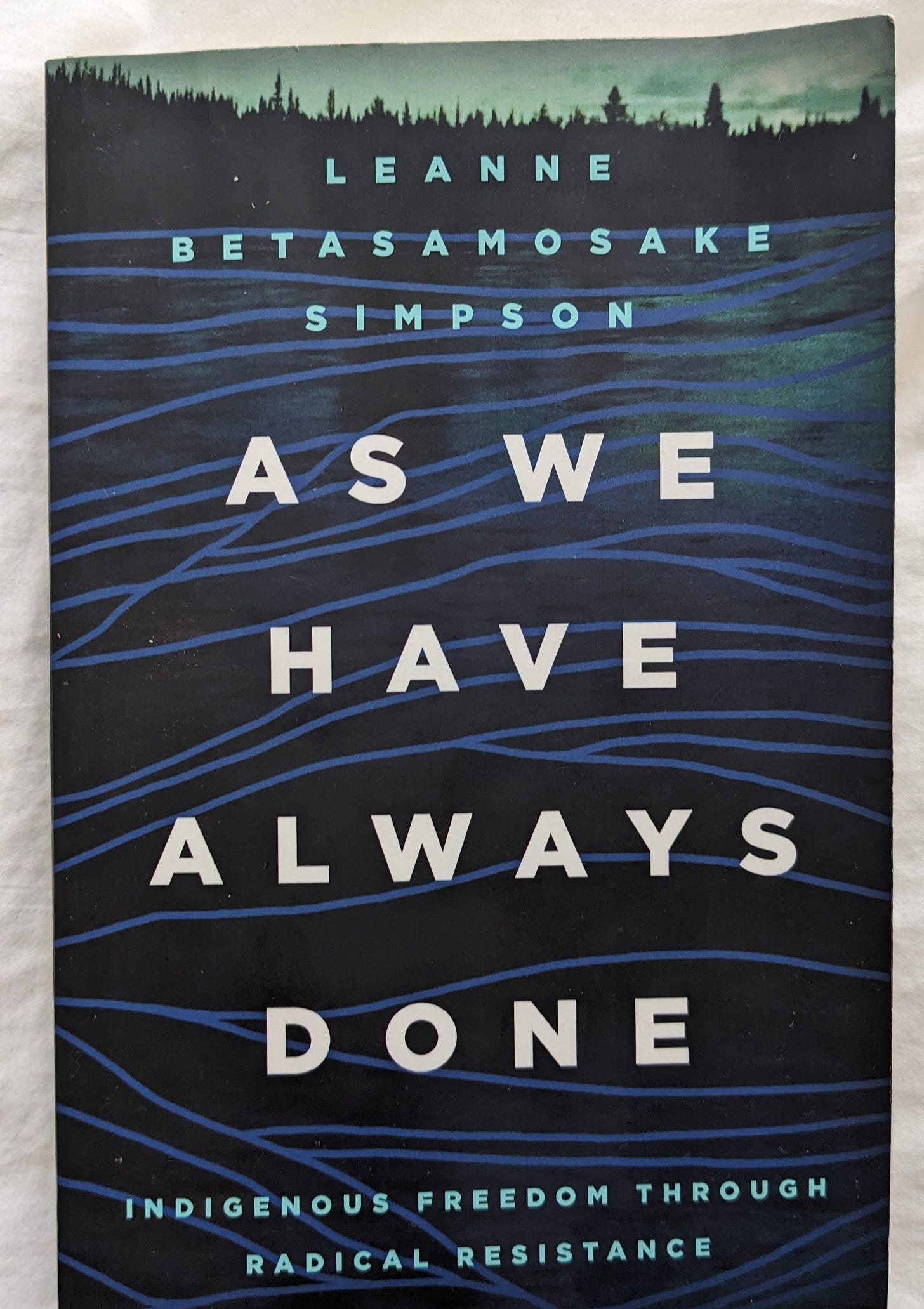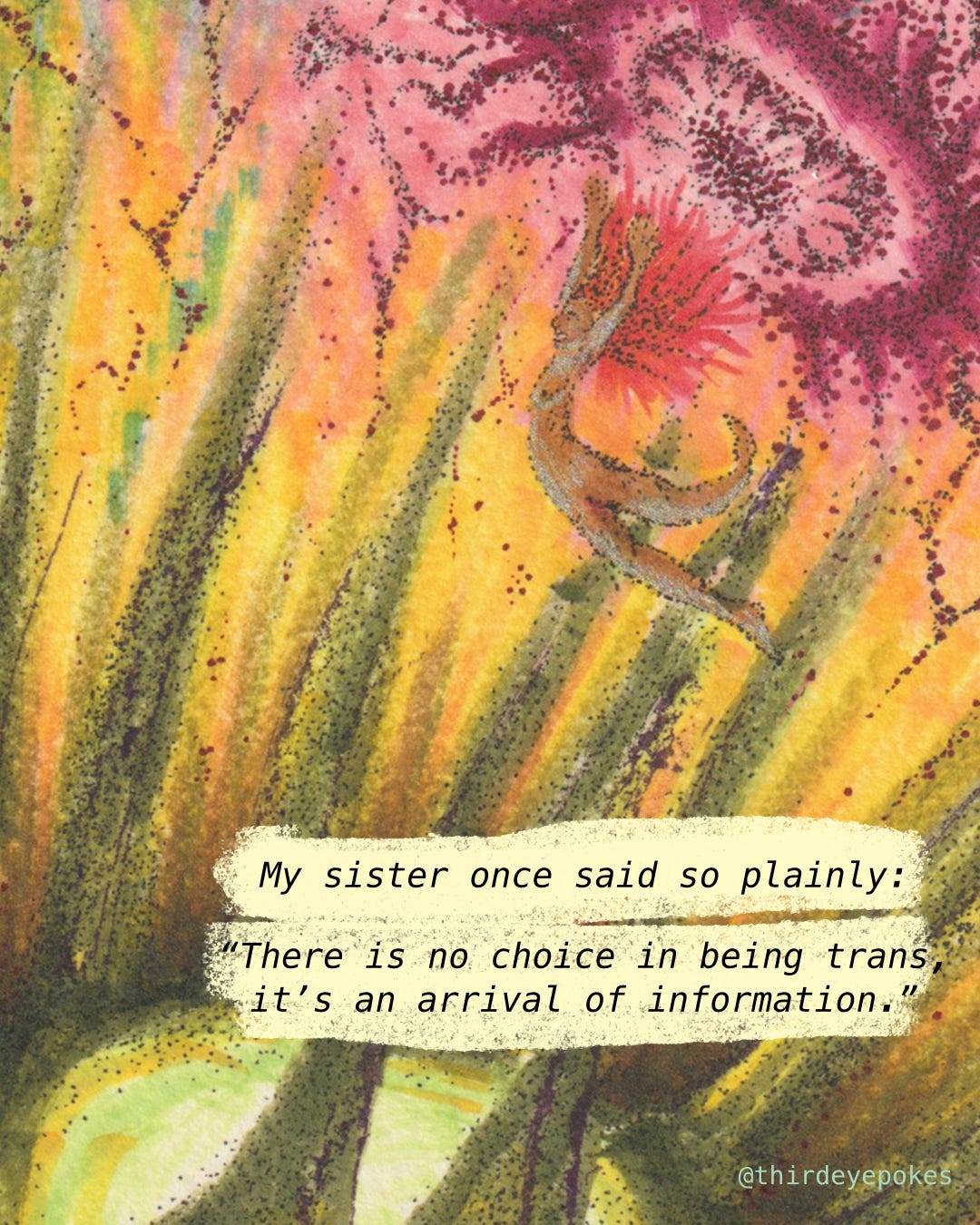All In a Name
A conversation on resurgence through queer +/trans bodies and the power to shift reality through (re)naming
This post is the edited version of an email reply to my friend Carah’s last newsletter entitled: Introducing Myself to You. Part of this particular piece was Carah recalling their experience having watched the film documentary “Sugarcane”. In the newsletter post, they share that they felt intrigued by the film’s title as it brought to mind the ancestral lineage and colonial history of indentured labourors brought to work on sugarcane plantations in Trinidad and Tobago — a lineage I partly share with my parents also being from T&T. Parallel to reading Carah’s newsletter article, I’ve also been reading a book they gifted me for my birthday: “As We Have Always Done” by Leanne Betasamosake Simpson. The book itself is a call to action around cultural resurgence and “alternatives to the destructive logics of the settler colonial state”. In my email response, I make my own connections between colonial violence, confronting history through a contextual lens, and queer +/or trans bodies being sites of resistance and resurgence — meaning, a rising again into life.
Thank you Carah for your brilliance and beautiful writing, receiving a very convoluted draft of this email, your willingness to edit said draft, and your enthusiastic consent to publishing this correspondence.
Dearest Carah,
Once again, your thoughtful ruminations and processing have found me on a perfectly timed day and I thank you for taking the time for writing such a profound, articulate, and sensitive piece.
It's a gloomy Monday morning - the perfect day to move slowly and thoughtfully into a new week.
As you know, I've been reading the brilliant book you gifted me "As We Have Always Done" by Michi Saagiig Nishnaabeg author, Leanne Betasamosake Simpson. It's making a huge impact on the way I've been thinking about building a life in accordance to place-based engagement with land and, inevitably, to how I conduct and see myself as a generational arrivant (term coined by Kamau Brathwaite). Someone once introduced this term to me a few years ago to address forced displacement and migration by way of colonial powers and imperialist agendas.
I choose the word arrivant to capture the fact that I am in so-called Canada only because of the process of displacement and violence which merely grazes imperialism and the continuous pillaging of T&T. I am also a direct descendent of indentured labourers with Afro-Indian blood on my paternal side. On my maternal side, there are unions of Indigenous and African ancestry and a whole load of other stuff. All of that is combined with both my parents being taken from their own mothes without consent or even due process as younger children.
In the Chapter 7 of Simpson's book, entitled The Sovereignty of Indigenous Peoples' Bodies she talks about chronologically tracing her maternal family back to a place in time when settlers began to impose the violence of heteropatriarchy using policy and regulation of family units, gender and gender roles, sexuality.
In a similar fashion, I feel it is important to retrace and recount lineage to in order to better understand the context of the times, possible impacts of the time's colonial violence, and how internalised colonialism made it possible for even my parents to have experienced such acute displacement. In Chapter 7, Simpson writes:
"There is a strong parallel between the dispossesion of Michi Saagiig Nishnaabeg from our homelands and the dispossession of Indigenous bodies from our grounded normativity" (106). Grounded normativity being: a series of complex, overlapping emergent and responsive network of relationships of deep reciprocity, intimate and global interconnection and interdependence, that spirals across time and space.
In recounting my lineage and lining it up with the chronology of that time's colonial imposition, I am able to name that the people and caregivers were inspired by their internalised colonialism to sever my parents from their homelands, thus their connection to their place-based culture and grounded normativity.
Leanne Simpson bridges the gap between land and bodies by highlighting the fact that an intervention between repeated psychological and material colonization has everything to do with the fact that women, trans +/queer bodies "house and reproduce Indigenous political orders" (115). Without connection to homeland or grounded normativity, it is difficult for communities to resist the impacts of colonialism. My parents' bodies may have been subjected to colonial violence by way of displacement, but what does that mean for me to exist inside trans and queer body and inherit this history and in the context of being in so-called Canada in 2024?
Plainly put: queer +/trans bodies and experiences interrupt the imposition of colonial temporalities. Our bodies remember the trauma of ongoing colonial violence and they can remember our histories before colonization and they can remember to exist for our futures, outside colonial time.
In reflecting on that beautiful quote from your sister, I think about the relationship between the term arrivant and its connection my queer +/trans body as descendent of migrants brought here (as opposed to coming here), and it being a beautiful confrontation asking: now that you have the information, what do you do with it?"
What if we, as queer +/or trans arrivants and/or descendents of arrivants, moved beyond land acknowledgments to ask for, center, and adopt Indigenous governance standards of the land that we live on? Would the ways we co-organize against and co-resist psychological and material colonialism be different if we didn't see ourselves as guilty, untethered settlers? What would our communities look like if we led our lives as intimately connected beings arriving into community with spiritual insight and critical information informed by solidarity with Indigenous nationhoods?
Chapter 8 of Simpson's book is named "Indigenous Queer Normativity" in which she begins by sharing (with consent) how one of her children was questioning her gender and, while in ceremony, it was normalized that this child was able to take on roles that made sense for her at that time — enacting both the women's and men's role and sat between the men's and women's side of the lodge. All of these actions were normalized by the child's entire community.
This, to me, is a beautiful example of how queer +/trans individuals and experiences are not and do not have to be isolated or irreparably severed from our communities as we choose to heal from colonial violence. We seamlessly belong in and to our communities and our communities’ history and future.
I think that your apt and beautifully open-ended calls to action are best taken up by 2S, trans +/queer bodies. Some of us are meant to be those members in our communities who help us embody our decolonized spiritual connections, aid in ushering in the spirit of cultural resurgence change from a spiritually grounded place. Our queer +/trans bodies not only reflect the rejection of colonial and imperialist standards but also embody spiritual soverignty in the 4D.
…
I loved your questions around ceremony: what it would look like; would it be naming; who would be invited; what ritual would take place?
Ceremony is significant because one does not just find themselves in ceremony, you have to consciously be there and be present. You have to choose to participate.
The first and only formal naming ceremony I ever attended was beautifully conducted for Black trans and gender diverse folks in Toronto, 2018 by Sunset Service (organized by Emkay Adjei-Manu and Othrr). I was so impacted by this ceremony because all of us in the room we there not only witness our loved ones, but to also claim our loved ones, the responsbility to protect them, and affirm their place in our community.
A ceremony, particularly of naming, is so powerful because naming confirms or changes reality. What would change if more and more of us saw ourselves and named ourselves as arrivants and descendents of arrivants? What paradigm shift could be made possible if the way we named and saw ourselves were grounded in historical truth? How would our goals for sovereignty shift if we contextualized our histories of migration and displacement? What kind of sustainable power could come of this consciousness shift?
…
Thank you for receiving my long reflection inspired from your newsletter post/conversation and for being the gentle force and spiritual being that you are.
In loving friendship and solidarity,
Sapphire




